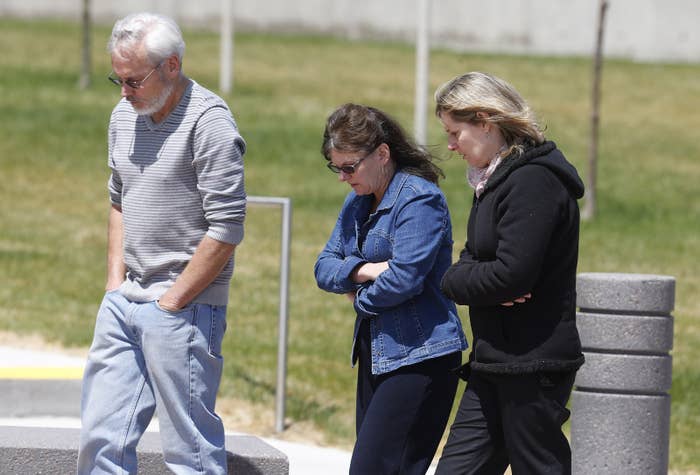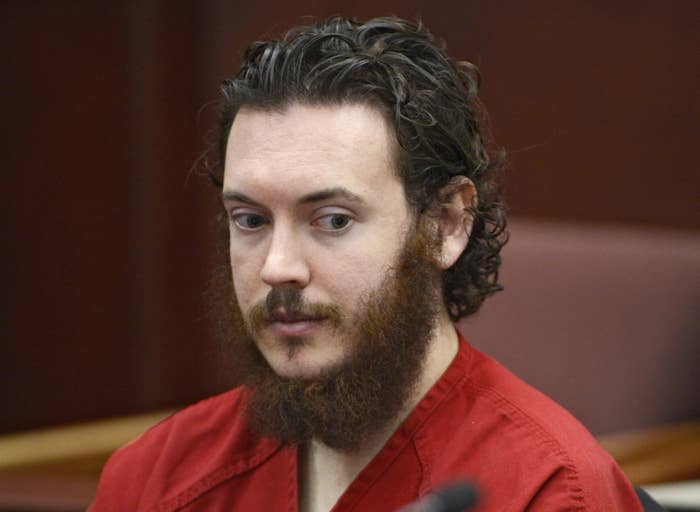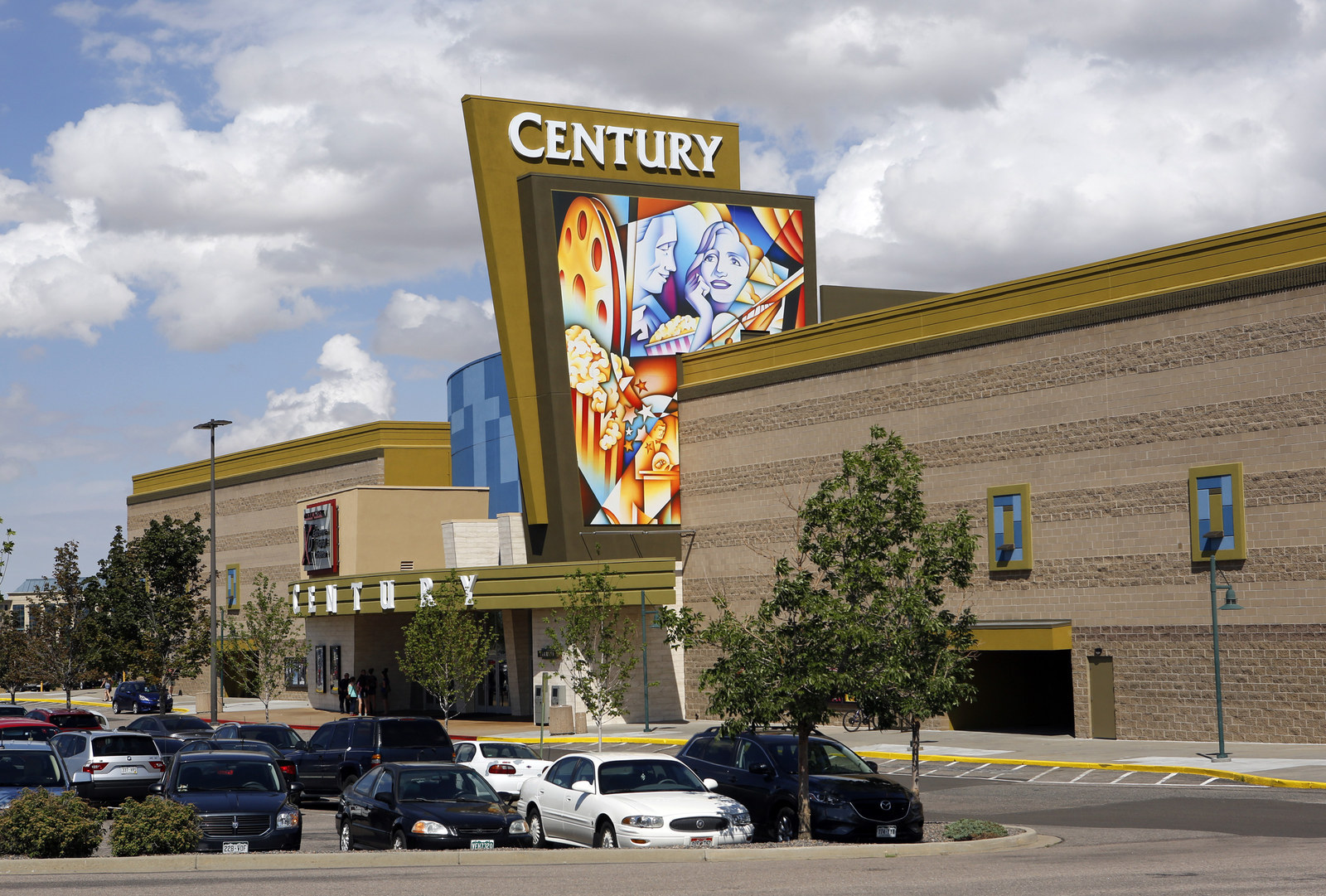
CENTENNIAL, Colorado — Katie Medley spoke with composure about some of the worst moments of her life: Saying "I love you" to her husband for what she thought would be the last time. Worrying for her unborn son. Slipping in a pool of blood.
Then there was the phone call to family members to tell them that, no, the baby hadn't come yet. There'd been a shooting at the Aurora, Colorado, movie theater and her husband was probably dead. In the following months, it was her husband's multiple brain surgeries and continued recovery.
After testifying Tuesday in the trial of movie theater shooter James Holmes, Medley took her seat among other survivors. And then, for a moment, the composure was gone, and she rested her head on her husband's wheelchair.
Survivors of the 2012 shooting massacre at the Century 16 theaters described how their confusion turned to terror as shotgun blasts were followed by automatic gunfire. Almost all who testified described how they believed they would die.
The testimony, photographs, and 911 calls played in court on Tuesday were graphic, and the emotional impact was palpable among jurors.

Defense attorneys for Holmes have argued that a number of the exhibits unfairly prejudice the jury against the 27-year-old, who is accused of killing 12 people and attempting to kill 70 others. The judge disagreed, acknowledging that prosecutors must sometimes present graphic evidence as they work to prove every aspect of the charges.
"The larger the magnitude of a crime, and the more gruesome the crime, the more gruesome the evidence is going to be," Judge Carlos Samour Jr. said.
At 12:05 a.m. on July 20, 2012, Theater 9 was full of energy. The stadium seats filled with friends, families, and coworkers who had anticipated the new Batman movie for weeks. Some showed up in costumes, and happy chatter rang out before the previews began.
About 15 minutes later, confusion set in. A canister thrown through the air was not a prank by rowdy kids, it was tear gas. Its flash and bang were mistaken for fireworks. The floor was sticky not with soda, but with blood.
Prosecutors began the testimony — which is expected to last for four months — by calling Medley. The night of The Dark Knight Rises' premiere, she was nine months pregnant, but suggested going out after she saw how excited her husband was watching an ad for the movie.
They and a friend sat near the theater's exit in case she went into labor. But when she saw a figure in body armor come through the emergency exit and toss a canister in to the air, she knew something was wrong. As shots rang out, she and her friend huddled on the ground, trying to avoid laying on her belly.
Then she noticed her husband, Caleb Medley, was still in his seat.
"That's when I saw blood pouring from his face," she said.
He had been shot through the eye, into his brain, and she didn't think he could survive. When the shots quieted, she slowly stood up. She poured a bottle of water into his mouth, trying to wash out the blood and keep him from choking.
The exit opened again, this time police yelling for anyone who could move to get out of the theater. Medley squeezed her husband's hand and said she loved him. She didn't want to leave, but thought of her unborn son.
"That's going to be the last piece of [Caleb] I have," she said. "I have to save him."
But Caleb Medley did survive — his wife giving birth while he was in brain surgery at the same hospital. He first held his son while he was in a medically induced coma.
On Tuesday, he took the witness stand in his wheelchair and testified with the aid of an alphabet board.
The traumatic brain injury still limits his movement and speech. Almost three years after the shooting, he can understand everything around him, but speech comes one word at a time and can be difficult for strangers to understand, his wife said.
Prosecutors asked him who he was, and if Katie was his wife. His voice thick, he said, "Yeah," then spelled out y-e-s for the court's records. It was far cry from the aspiring comedian who had performed a standup set just days before the theater shooting.
Holmes' defense attorneys have asked no questions of the Medleys or other victims — they do not dispute what happened in the theater, or that Holmes was the gunman.

Husband and wife Anggiat Mora and Rita Paulina took their then-14-year-old son Prodeo Patria to the movie for family bonding. That was important, Mora said, even though he was exhausted from working that day.
Paulina, via an Indonesian interpreter, said her husband had to tell her to get to the ground three times before she realized what was happening. During a lull in the shooting, Mora told his son and wife to run.
They moved toward the hallway to the lobby, where Paulina saw a solitary figure holding "something long," though she could not identify it as a rifle. Mora thought the family was headed the wrong way, but he kept following.
"Well, if we die together," he said he thought, trailing off.
Paulina managed to tell her son to turn around, and they made it to the emergency exit, where they found a woman with an injured man. The teen helped the woman support the man as they walked out.
Paulina said she felt her arm turn loose and warm.
"What happened to my arm? It's like a zombie," she told her husband.
He told her to keep moving. But then her leg was struck, and she fell to the ground.
Her husband pulled her out the door, then carried her on his back for about 30 feet to the sidewalk and set her against the theater's wall. Flashing lights were already making their way into the parking lot.
The first officer to see them pointed his gun and told them to put their hands up.
"I don't care if you want to shoot me again, shoot me," Paulina said.
Then the officer saw their injuries — a shot in her son's lower back, three bullets to her arm and leg, and her husband covered in blood from carrying her.
Many in the theater never saw the shooter, dressed entirely black and standing in a corner.
After the first bangs, Derick Spruel said he tried to keep watching the movie — he was sure it was just a prank. His friend and coworker from Buckley Air Force Base, Jesse Childress, stood up in their row, jolted, then fell.
"When he fell down, I told everyone to get down," said Spruel, who was sitting with his wife and another coworker.
When the lights came on and police arrived, he screamed Childress' name and tried to lift him.
"I really tried to pick him up," Spruel said, adding that the moment sticks out in his mind. "I could not. I wanted him to come with us."
He didn't find out until the next evening that Childress had died.
Spruel's voice lowered on the stand.
"I had to leave Jesse."
